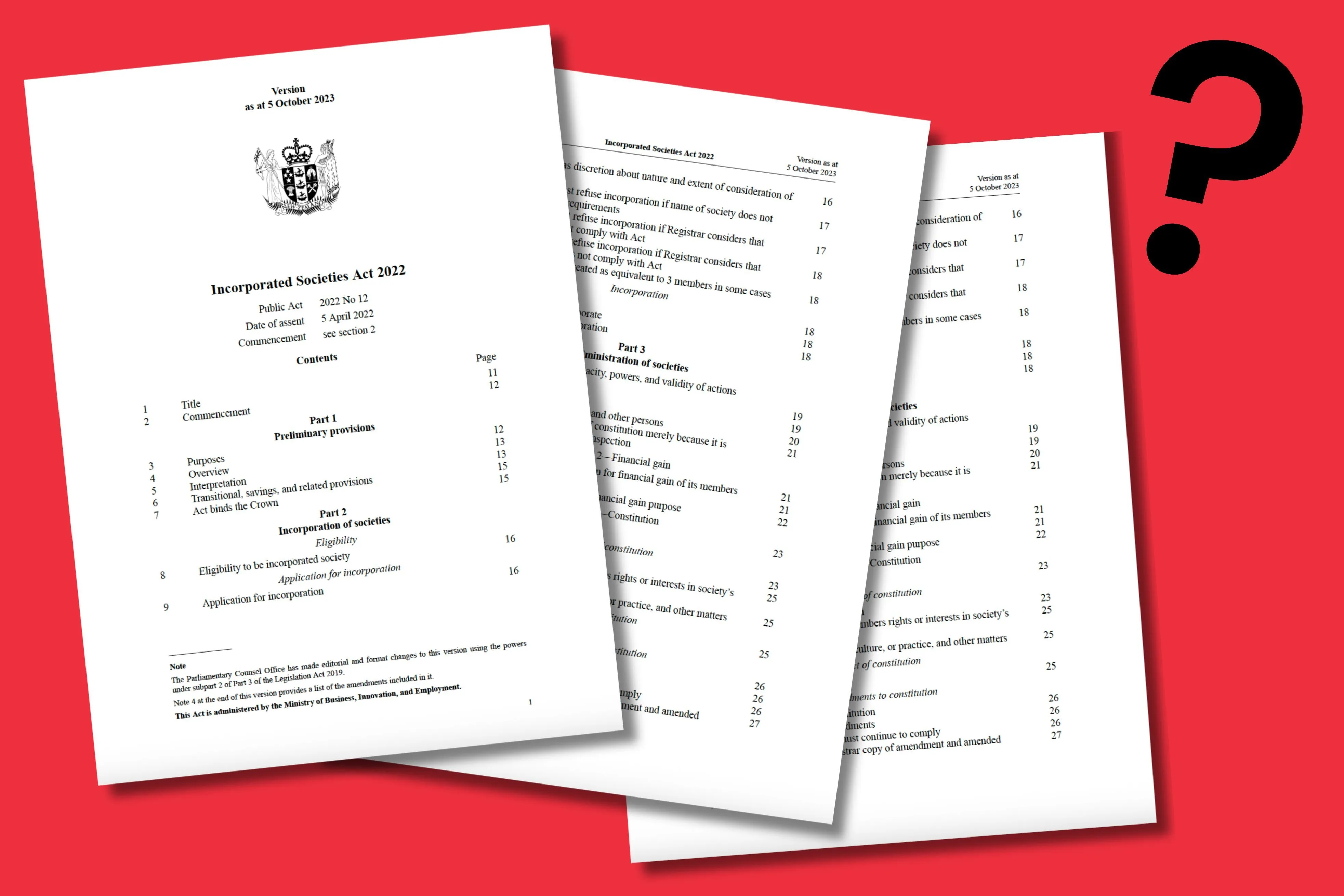What you need to know (and do) about the legal changes to Incorporated Societies
All incorporated societies need to re-register under the new act by 5 April 2026 – the sooner you prepare, the better.

Big changes are coming for incorporated societies in Aotearoa under the Incorporated Societies Act 2022. Here is trusted financial advisor Robert Westall's guide for what board members or committees need to know (and do) before the looming 5 April 2026 re-registering deadline.
What is an Incorporated Society?
In short, it’s a legal structure for community organisations. Sounds boring, but essential for the array of vibrant local organisations to have a robust, flexible and community-focused legal structure. It allows community organisations to operate effectively with membership, protect members from legal liability, and help build a lasting impact in Aotearoa.
The structure allows arts groups, clubs and other organisations to operate as non-profits, supporting a cause important to the membership – without the complications of income tax or shareholder structures. This includes arts collectives, art galleries, sports clubs, cultural groups or other charitable organisations. In fact in Aotearoa, a large portion of arts organisations are incorporated societies. So if you’re reading this, there’s a good chance you’re a member of one… or even sit on the governing board!
What’s Changing?
All incorporated societies are regulated by acts of the New Zealand parliament, which set out how they must report, govern and manage their assets. In October 2023, a new act replaced the old 1908 legislation, ordering every incorporated society in New Zealand to re-register by 5 April 2026.
If you’re a committee member or the manager of an incorporated society, it’s important to get to grips with the new rules. Below, I’ll outline the changes and what to watch out for when re-registering.
What to watch out for
- If you don't re-register you could lose your organisation’s name and assets. The cut off is 5 April 2026. If you don't act, then your society will be removed from the register – meaning you could lose the organisations name and control over the assets of the society.
- You will need to rewrite your constitution to match the new rules. Every society must have a constitution that meets the new requirements on things like dispute resolution, officer duties and financial controls.
- Officer rules are stricter now. Officers (committee members) have stricter duties and must sign written consent forms. Some people can no longer be officers (if you’re under 16, bankrupt, or have certain convictions).
- A minimum of 10 members is now required. You must have at least 10 members at all times. This also means that the role of the registrar is more important than ever.
- You have to keep your finances in order. Annual financial statements and returns are now required for all societies, and you need to keep your records up to date.
- Make sure it’s done correctly. If you don’t update your constitution to meet the new requirements, your society could be struck off the register.
Tips for re-registering
- If in doubt, get experienced advice. An expert will help make sure your constitution covers everything the new legislation requires.
- Consider bringing in an independent advisor. In some cases, a board may want independent advice on how a new constitution could affect them. An independent adviser can provide support in re-writing your constitution, helping you understand the impact of the changes affecting governance, management and your organisation’s assets.
- If you are an officer of a society, understand your new obligations. Take time to understand how the changes and new constitution might affect your decision making, strategic goals, assets/balance sheet and your membership.
- Plan ahead. For some it will be an easy and fast process. However, for others it may take longer than you think to rewrite your rules, consult with members and hold meetings to get changes approved.
- Communicate. If you are clear with members about the intention of the new constitution and any changes, the process will be smoother.
- Do your due diligence. For example – collect written consent from all officers, and check they meet the new officer criteria. Don't get caught out thinking you can hide behind the old rules.
- Hold a general meeting (AGM/SGM) so the members can approve the new constitution. A majority of members will likely need to approve the proposed constitution. Send the new constitution out ahead of the meeting so members can understand what they’re voting on.
- File your application online. The admin/forms can be done online. Keep an eye out for any follow-up from the Companies Office.
- Bring everybody with you. Explain to all stakeholders why these changes matter, what’s involved and how it might create opportunity and focus.
Why re-registering is an opportunity for Incorporated Societies

As we all know, boards can be political and at times difficult to navigate. In some cases, both boards and managers misunderstand their function in the governance of an organisation. This is often due to a lack of structure, communication of roles, and controls. Re-registering can provide an excellent opportunity to tackle these governance issues. Consider it an opportunity to develop focus, build in controls and provide board members, managers and officers with training of the new rules and obligations. This may also help resolve any long standing board disagreement that is bottleneck-ing your progress. If the board is split and trust is wearing thin, then consider an independent advisor to get the ball rolling.
It’s also an excellent opportunity to reset and reshape your organisation's financial, operational and asset strategy – setting a future-focussed direction, achieving the organisation's wider aspirations and ensuring the constitution is up to the task of a modern forward facing organisation. This will help build vision and strength! Again, bringing in an independent advisor will give your organisation an unbiased, fresh set of eyes that will help deliver your strategic goals.
Re-registering is an opportunity to future-proof your organisation. This is a chance to tidy up your rules, sort your governance and set up your organisation for the future. Importantly, getting the right independent advisor (someone like me) on board is vital to ensure an unbiased voice, resolve any existing governance issues and guide you through what’s changing.
Robert Westall is the founder of Naked Accounting, Naked PR and his new strategic partnership N2. If you need help navigating and re-registrating, he can guide you through the process, help you understand what’s changing and make sure your assets, structure and members are protected. Recognised as a trusted advisor to New Zealand’s creative sector, Robert is known for his financial guidance and deep understanding of the unique challenges faced by creative organisations. He has empowered organisations to transform tough times into opportunities of growth and success.